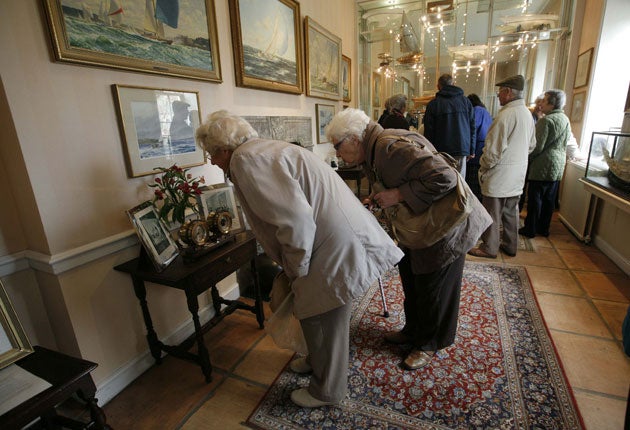Disorder in the House as Sir Ted's legacy leads to row
Campaigners fight-on to keep Arundells, the late prime minister's listed home, open to the public

Your support helps us to tell the story
From reproductive rights to climate change to Big Tech, The Independent is on the ground when the story is developing. Whether it's investigating the financials of Elon Musk's pro-Trump PAC or producing our latest documentary, 'The A Word', which shines a light on the American women fighting for reproductive rights, we know how important it is to parse out the facts from the messaging.
At such a critical moment in US history, we need reporters on the ground. Your donation allows us to keep sending journalists to speak to both sides of the story.
The Independent is trusted by Americans across the entire political spectrum. And unlike many other quality news outlets, we choose not to lock Americans out of our reporting and analysis with paywalls. We believe quality journalism should be available to everyone, paid for by those who can afford it.
Your support makes all the difference.The fate of Sir Edward Heath's legacy, his former home in the Close of Salisbury Cathedral and his personal artefacts, lies in the hands of the Charity Commission after a group of supporters challenged a decision to shut the house for good.
Arundells, the Queen Anne-style property that the former PM left to the nation, will close to the public on Wednesday unless the Charity Commission intervenes in an increasingly ugly row that has split the trustees and dismayed the Sir Edward Heath Charitable foundation, which has run the house since Sir Edward's death in July 2005.
Two of the seven trustees have resigned, including Lord Black, the executive director of Telegraph Media Group.
The trustees, headed by the former Cabinet Secretary Lord Armstrong, want to sell off the Grade II* listed building and its contents, which include paintings by John Singer Sargent and Sir Winston Churchill and precious ancient Chinese porcelain.
They intend to use the proceeds to fund educational scholarships, another stipulation of Sir Edward's will, who himself received financial help when a Balliol College, Oxford, organ scholar.
A campaign to keep Arundells open and Sir Edward's belongings intact could stymie those plans if the Charity Commission forces the trustees to reopen the museum to visitors.
The issue is financial: the foundation relies on revenue from visitors for the house's upkeep because the £5m Sir Edward left in his will is tied up in the building and its contents, worth £2m.
Although the pre-booked tours of Arundells have operated at capacity since starting three years ago, the foundation lacks the money to maintain the property, which dates back to the 13th century.
The trustees have already sold Sir Edward's archive to the Bodleian Library for £850,000.
Stuart Craven, Arundells' curator who has worked there since being hired by Sir Edward to landscape its gardens in 1985, said: "We were hoping the trustees would give us the money to keep running the place." They didn't.
Marie Elliker, from Christchurch, Dorset, was one of the lucky visitors to the house yesterday. "If he left it to the nation, then they've got no right to sell it," she said.
Ian Stewart, from Sutton, Surrey, was one of thousands unable to buy a ticket for what might prove to be the last weekend Sir Edward's possessions are on view. He had to make do with a wander around the two-acre grounds, which stretch down to the confluence of the rivers Avon and Nadder.
"It's terrible it's closing," he said. "It would be nice if something could be done to keep it all together, even if they had to have pop concerts in the garden."
Linda Hulley, who travelled down from London for the day, was among the crowd who failed to gain access to the house. "I didn't want to see it because of his politics but because of his lifestyle," she said. Her husband, David, 67, was luckier, scraping in as the 14th person on one of yesterday's final tours.
Mr Hulley's interest was musical: he wanted to see some of Sir Edward's memorabilia, from his Steinway grand piano to pictures of him conducting some of Europe's great orchestras.
Join our commenting forum
Join thought-provoking conversations, follow other Independent readers and see their replies
Comments